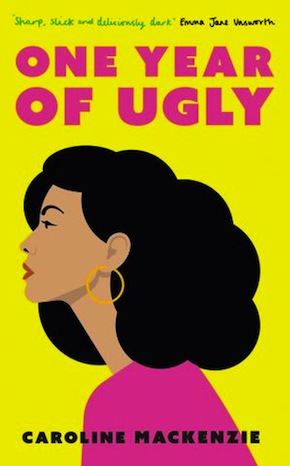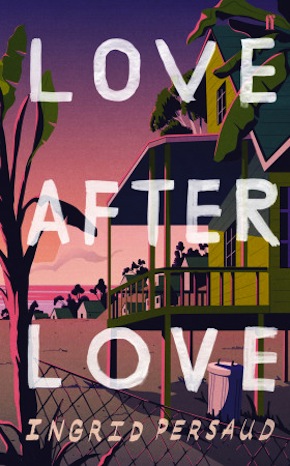Island voices
by Rabeea Saleem
“A gorgeous exploration of love, family, and what it means to call a place home.” Laura Jane Williams
Most people’s vision of the two-island nation of Trinidad and Tobago would comprise gorgeous, untainted beaches, lively festivals and scrumptious Creole cuisine, while V.S. Naipaul put the islands on the literary map with his early Trinidad-set novels, most notably A House For Mr Biswas. Two singularly brilliant debuts – One Year of Ugly by Caroline Mackenzie (The Borough Press, 23 July) and Love After Love by Ingrid Persaud (Faber & Faber, 2 April) – offer parallel, if differently slanted views of contemporary life on the islands.
One Year of Ugly is an effervescent, madcap romp through the trials and tribulations of a Venezeualan family living as illegal immigrants in Trinidad. The protagonist Yola Palacio begins the story by telling us about the death of her Aunt Celia – a fiery force of nature who led an eventful life. Now she is dead, as if her loss was not enough, the family finds out she had some unfinished business with Ugly, a local mobster. Now Ugly wants the Palacios family to settle Aunt Celia’s debt by doing his bidding for a year involving his various covert, illicit operations.
Mackenzie takes a gravely serious topic and gives it a hilarious, trenchantly observant spin. The year that follows is turbulent and bizarre for Yola and her family as Ugly turns all their homes into safe houses providing temporary shelter to illegal immigrants brought in from Venezuela. To add to Yola’s strain, she falls head over heels in love with Ugly’s charismatic henchman Román. Since Ugly takes no prisoners, it is imperative that Yola and Román hide their relationship from him and also from Yola’s family – which as the story progresses becomes increasingly tough. Yola, a writer and part-time translator, bids farewell to her previous sedentary lifestyle and gets accustomed to constant chaos.
Family drama ensues as stepchildren appear out of the blue and sparks fly between the unlikeliest family members, but MacKenzie grounds such melodramatic happenings in reality with a generous dose of charm and sardonic wit. There are moments when the Palacios have their backs against the wall and, despite an irrepressible zeal for life, they have to face stark truths. Yola describes their plight as a classic immigrant story of illegal refugees risking everything for a life in a new country, only to be stripped of their rights while scuttling into the shadows like cockroaches: “Anyone can crush you under their heel, splatter your little roach innards, just like Ugly was doing to us.”
The narrative is interspersed with journal entries from Aunt Celia’s diary that Yola chanced upon. From the whip-smart Yola to her remarkably adaptable, streetwise businesswoman Mama to the vigilant spinster Aunt Milagros, all the women in the Palacio household are headstrong, spirited, unfazed Latina ladies who have long realised they have to take the reins from their hot-blooded but stupid men. “Maybe we all have the natural compulsion to make excuses for men,” observes Yola, “or else the world would descend into anarchy as wives, girlfriends and daughters mass-murdered all the cheating husbands, boyfriends and baby-daddies out there.”
These two remarkably talented Trinidadian voices are poised to leave their mark on the literary world.”
The tone is consistently irreverent and entertaining without becoming grating or cocky. There are zingers on almost every page. When Yola’s father initially tries to rationalise Ugly’s offer for them to house illegals as an opportunity to help their countryfolk find a better life, and the entire family caves in, Yola reports: “Nothing appealed to a pack of wayward Catholics like a Good Samaritan reference.”
The Trinidad that is advertised globally is very different from the reality, especially for immigrants. While the country touts itself as “this cosmopolitan melting pot, swirling with all the flavours of the race rainbow”, “a pall of Otherness follows you” like a repugnant stench that manifests in the forms of “relentless catcalls, the unshakeable instinct that you should always keep your eyes on the pavement, and a keen awareness that you are constantly being watched.” Yola highlights how this stigma is exacerbated for Latinas: “Trinidadian public opinion deems us all, each and every one, a stripper, hooker, aspiring trophy wife, or sneaky conniving slut.”
As an immigrant, Yola is primed to see Trinidadians as a homogeneously negative group, because of their attitude towards outsiders. Through the characters of Aunt Milagros and Yola’s father, MacKenzie depicts the lingering psychological and emotional trauma that haunts immigrants and how it shapes their personalities. And true to the messy situation the Palacios family have lived with for years, she refuses to give them a neatly wrapped-up ending.

“A captivating interrogation of love in all its forms.” Sara Collins, Guardian
Ingrid Persaud’s Love After Love offers an equally messy and alarming opening. Betty Ramdin, after suffering years of domestic abuse at the hands of her alcoholic husband Sunil, finds respite in widowhood when he suffers a fatal fall from the stairs. She settles well into her new normal, which features a lodger she takes in, Mr Chetan, who turns out to be an incredibly decent man. They form a family of sorts along with Betty’s son Solo, who shares a very close bond with Mr Chetan. With typical, immaculately phrased colloquial rhythm, Betty notes: “You should see Mr Chetan and Solo, happy as pappy and I’m like a Wednesday in the middle.”
Betty’s feelings grow for the gentle Mr Chetan and “the little kindnesses he adds to my life”, and after she realises he is gay they settle into a harmonious platonic relationship. Persaud lingers on Trinidadians’ passion for food and how they use it as an expression of love. One thing you can definitely gain from this book are mouthwatering tricks for cooking exotic dishes like cascadoux, of which Betty remarks, “that little fish sweeter than all the rest of fish put together… They say if you eat it you will never leave Trinidad.”
Along with the inviting colloquial cadences, Persaud can pack years in a single paragraph while seamlessly launching into the next which minutely narrates a character’s internal monologue. The twist in the story comes when Solo eavesdrops on Betty and Mr Chetan revealing their deepest, darkest feelings – and a terrible secret about his father’s death. Hurt and furious, Solo, with the impulsivity of a teenager, makes the rash decision to go to the US to his uncle under the guise of a vacation. With Mr Chetan eventually moving out, Betty tries to stave off her loneliness and repair her relationship with her estranged son. She also tries to come up with reasons for why she put up with Sunil for so long, holding out hope that he would change.
Persaud gives a solemn indictment to the internalised misogyny and prevalent patriarchy that helps sustain violent and demeaning acts against women, and how women are conditioned to tolerate violence and denigration in many cultures around the world. “That man only gave love you could feel. He cuff you down? Honeymoon. He give you a black eye? True love in your tail. He break your hand? A love letter. He put you in hospital for a week? Love will stay the course. He take a knife and stab your leg? Until death do us part.”
Love After Love, filled with sharp insights about universal and peculiarly Trinidadian relations, is a tenderhearted story about the different kinds of love people find around them and the myriad ways in which they reconcile hope and reality. And like One Year of Ugly, it describes the sights and sounds of vibrant island life in vigorous detail. With their richly textured plotlines and well etched-out characters, these two remarkably talented Trinidadian voices are poised to leave their mark on the literary world.
 Caroline Mackenzie studied in the UK on an Open Scholarship for four years to qualify as a specialist translator before returning to her native Trinidad, where she began writing more extensively. Her short fiction has appeared in literary publications around the world, and in 2017 she was shortlisted for the Commonwealth Short Story Prize. In 2018 she was named the Short Fiction winner of the Small Axe Literary Competition. One Year of Ugly is published by The Borough Press.
Caroline Mackenzie studied in the UK on an Open Scholarship for four years to qualify as a specialist translator before returning to her native Trinidad, where she began writing more extensively. Her short fiction has appeared in literary publications around the world, and in 2017 she was shortlisted for the Commonwealth Short Story Prize. In 2018 she was named the Short Fiction winner of the Small Axe Literary Competition. One Year of Ugly is published by The Borough Press.
Read more and pre-order
@BoroughPress
Author portrait © Marlon James
 Ingrid Persaud won the Commonwealth Short Story Prize in 2017 and the BBC Short Story Award in 2018 with ‘The Sweet Sop’, a tender tale of a son reconciling with his dying father through chocolate. She read law at the LSE and was a legal academic before taking degrees in Fine Art at Goldsmiths, University of London and Central Saint Martin’s. Her writing has appeared in Granta, Prospect and Pree magazines. Born in Trinidad, she lives in London and Barbados. Love After Love is published by Faber & Faber.
Ingrid Persaud won the Commonwealth Short Story Prize in 2017 and the BBC Short Story Award in 2018 with ‘The Sweet Sop’, a tender tale of a son reconciling with his dying father through chocolate. She read law at the LSE and was a legal academic before taking degrees in Fine Art at Goldsmiths, University of London and Central Saint Martin’s. Her writing has appeared in Granta, Prospect and Pree magazines. Born in Trinidad, she lives in London and Barbados. Love After Love is published by Faber & Faber.
Read more and buy the book
@IngridPersaud
@Faberbooks
Author portrait © Russell Watson
Rabeea Saleem is a Pakistan-based book critic presently writing for international publications including The Irish Times, Book Riot, Chicago Review of Books, Vol.1 Brooklyn and The National.
@KarachiGeek

